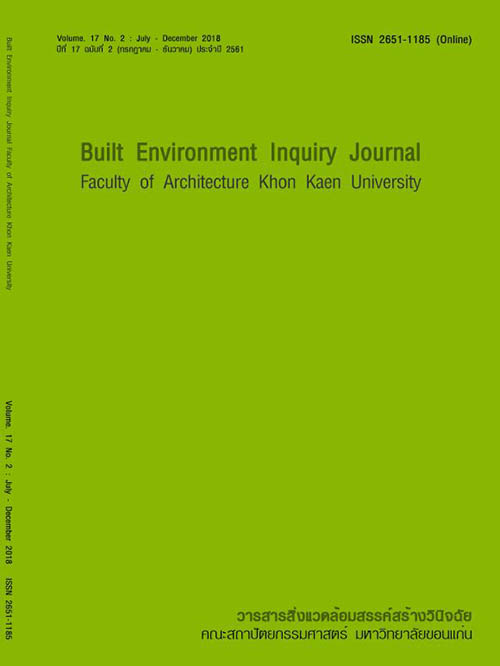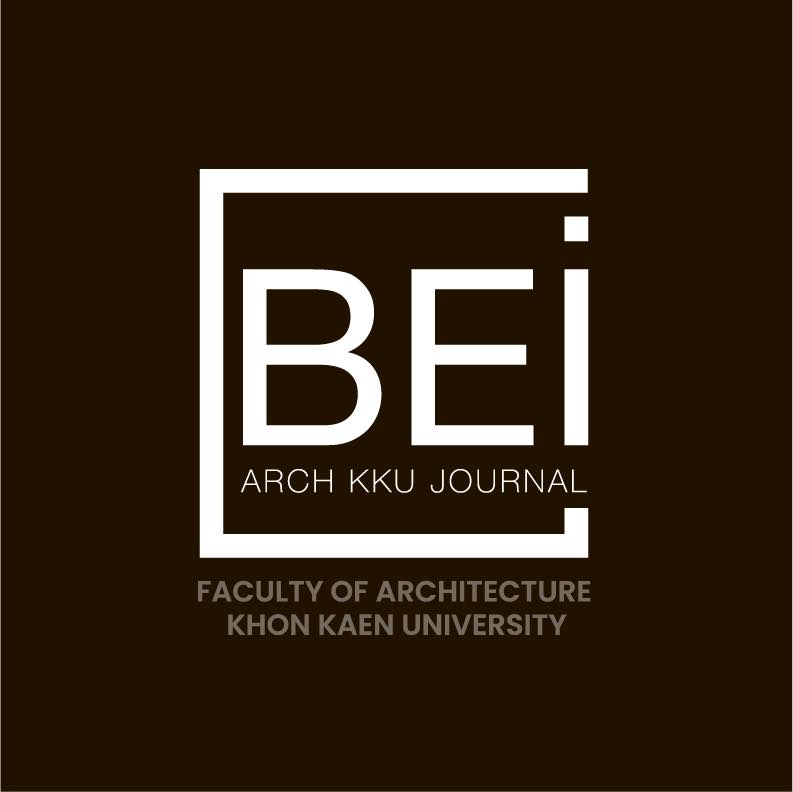ความเหลื่อมล้ำในเมืองมหานคร:บทปริทรรศน์ความรู้ในบริบทประเทศไทย
The Synoptic Review from Thai’s Context
คำสำคัญ:
เมืองมหานคร, ความเหลื่อมล้ำในเมือง, กรุงเทพมหานครบทคัดย่อ
การศึกษาความเหลื่อมล้ำในเมืองมหานครได้อภิปรายพหุลักษณ์ของอาการและสาเหตุแห่งความเหลื่อมล้ำโดยจำเพาะลงในลักษณะเชิงพื้นที่เมืองของบริบทของกรุงเทพมหานครและปริมณฑล พบว่าการศึกษาก่อนหน้าที่เกี่ยวกับประเด็นความเหลื่อมล้ำมีอยู่จำกัด จากการทบทวนวรรณกรรมของคณะผู้วิจัยได้พบอาการและสาเหตุของความเหลื่อมล้ำอันสามารถอนุมานเพื่อเชื่อมโยงให้เห็นสาเหตุและปรากฏการณ์ความเหลื่อมล้ำของเมืองมหานครภายใต้บริบทของประเทศไทยได้พอสังเขป โดยด้านหนึ่งนั้นเมืองมหานครเป็นภูมิ-เศรษฐกิจที่สัมพันธ์กับระบบเศรษฐกิจและระเบียบโลก (Global City) ในฐานะประตูทางเข้าของระบบทุนเชิงภูมิศาสตร์ (Capital Gateway) ในอีกด้านหนึ่งจากบริบทเฉพาะของประเทศไทยที่การรวมศูนย์เชิงอำนาจทางการเมืองและเศรษฐกิจได้ควบแน่นไปกับการพัฒนาและความเปลี่ยนแปลงเชิงพื้นที่อย่างกรุงเทพมหานครและขยายตัวออกสู่ปริมณฑล คณะผู้วิจัยสรุปถึงมูลเหตุของกลไกการสร้างความเหลื่อมล้ำซึ่งภาวการณ์นี้ได้ก่อให้เกิดความเหลื่อมล้ำต่อคนจนเมือง 3 ด้าน ประกอบด้วย 1) ความเหลื่อมล้ำในทรัพยากรและที่ดินต่อมิติด้านสิทธิที่จะอยู่ในเมือง 2) ความเหลื่อมล้ำในมิติด้านการเข้าถึงโอกาสทางเศรษฐกิจที่การพัฒนา และ 3) ความเหลื่อมล้ำในมิติการเข้าถึงและการสร้างอำนาจต่อรองทางการเมือง
เอกสารอ้างอิง
คณะกรรมการปฏิรูป (2554ข). แนวทางการปฏิรูปประเทศไทย: ข้อเสนอต่อพรรคการเมืองและผู้มีสิทธิเลือกตั้ง. กรุงเทพฯ: ผู้แต่ง
คณะกรรมการปฏิรูป (2554ค). รายงานภาคผนวก: รวมเอกสารข้อเสนอและเอกสารทำงานฉบับร่างของคณะกรรมการปฏิรูป กรุงเทพฯ: ผู้แต่ง
ชาตรี ประกิตนนทการ (2549) โครงการวิจัยเพื่อจัดทำแผนแม่บทเพื่อการอนุรักษ์และพัฒนา ชุมชนบ้านไม้โบราณ "ป้อมมหากาฬ" กรุงเทพฯ: สถาบันวิจัยและพัฒนา มหาวิทยาลัยศิลปากร
ฐิติวัฒน์ นงนุช และ ณัฐวุฒิ อัศวโกวิทวงศ์ (2559) การทบทวนวรรณกรรมเรื่องความเหลื่อมล้ำในบริบทเมืองศูนย์กลาง. เอกสารประกอบการประชุมวิชาการประจำปีมหาวิทยาลัยศรีปทุม SPU Conference 2016, 21 ธันวาคม 2559
ณัฐพล แสงอรุณ (2555) สิทธิที่จะอยู่ในเมือง: ภาพสะท้อนจากการเคลื่อนไหวเพื่อสิทธิการอยู่อาศัยของ ชุมชนบางบัว. วารสารวิจัยและสาระทางสถาปัตยกรรมและการผังเมือง 9(1): 1-12.
ณัฐวุฒิ อัศวโกวิทวงศ์ และคณะ. (2557). มรดกชุมชนท่ามกลางมรดกประวัติศาสตร์ชาติ: ความพยายามในการอนุรักษ์ชุมชนวัดราชนัดดา. วารสารวิชาการคณะสถาปัตยกรรมศาสตร์ จุฬาลงกรณ์มหาวิทยาลัย 63: 43-54.
ดิเรก ปัทมสิริวัฒน์ และคณะ (2555). ความเหลื่อมล้ำของโอกาสการศึกษาและมาตรการการคลังเพื่อขยายโอกาสการศึกษาให้เยาวชนยากจน. วารสารเศรษฐศาสตร์ปริทรรศน์ สถาบันพัฒนาศาสตร์ 6(1): 1-36.
เดชา สังขวรรณ และรุ่งนภา เทพภาพ (2553) ปัญหาคนจนเมืองในชุมชนแออัด : องค์ความรู้และกระบวนการขับเคลื่อน เปรียบเทียบประเทศไทย และประเทศเกาหลี. วารสารเอเชียตะวันออกศึกษา 15(1): 39-56.
ปนายุ ไชยรัตนานนท์ และคณะ (2557) โครงการจัดทำแผนพัฒนาที่อยู่อาศัย/แผนป้องกันและแก้ไขปัญหาชุมชนแออัด จ. นนทบุรี, รายงานศึกษา เสนอต่อการเคหะแห่งชาติ, ตุลาคม
ปิยะพงษ์ บุษบงก์. (2557). นโยบายพัฒนาเมืองในประเทศไทยในทศวรรษที่ผ่านมา. กรุงเทพฯ: สถาบันคลังปัญญาด้านยุทธศาสตร์ มหาวิทยาลัยรังสิต
พิชญ์ พงษ์สวัสดิ์. (2553) “มองสังคมผ่านชีวิตในชุมชน ‘เจ้า-ชาวบ้าน’ ด้วยสายตาของ ‘เจ้าชาวบ้าน’ ที่ชื่อ อาจารย์ (ม.ร.ว.) อคิน รพีพัฒน์” ใน มองสังคมผ่านชีวิตในชุมชน. อคิน รพีพัฒน์, 5-27. กรุงเทพฯ: ศูนย์มานุษยวิทยาสิรินธร
ไพสิฐ พานิชกุล (2558). ยุติธรรมชุมชน รากฐานความเป็นธรรมของสังคมไทย. www.snc.lib.su.ac.th/serindex/dublin.php?ID=13399531365. สืบค้นวันที่ 1กุมภาพันธ์ 2559.
สถาบันอนาคตไทยศึกษา. (2556ก) 8 ข้อเท็จจริง ความเหลื่อมล้ำในไทย. กรุงเทพฯ : สำนักพิมพ์สร้างสรรค์.
สมชัย จิตสุชน. (2552) Sources and Pro-Poorness of Thailand’s Economic Growth www.tdri.or.th/research/sources-and-pro-poorness-of-thailands-economic-growth .สืบค้นวันที่ 1 กุมภาพันธ์ 2559
สุริชัย หวันแก้ว (2558) ลดความเหลื่อมล้ำ ทางออกที่ต้องไปให้ถึงของประชาธิปไตยไทย www.healthstation.in.th/action/viewvideo/3420/. 1 กุมภาพันธ์ 2559.
อคิน รพีพัฒน์ และคณะ (2541) รายงานการศึกษา โครงการวิจัยและปฏิบัติการวิวัฒนาการชุมชนแออัดและองค์กรชุมชนแออัดในเมือง. กรุงเทพฯ: สำนักงานกองทุนสนับสนุนการวิจัย
อภิวัฒน์ รัตนวราหะ. (2552) ความเหลื่อมล้ำเชิงพื้นที่ในประเทศไทยระหว่างปี พ.ศ.2524-2548. บทความอภิปราย 2552-1, ภาควิชาการวางผังเมือง คณะสถาปัตยกรรมศาสตร์, กรุงเทพฯ : จุฬาลงกรณ์มหาวิทยาลัย.
Akita, T. and Pagulayan, M.S. (2014). Structural Changes and Interregional Income Inequality in the Philippines, 1975-2009. Review of Urban and Regional Development Studies 26(2): 135-154.
Akita, T. and Pirmansah, (2011). Urban Inequality in Indonesia. Economic and Development Series 2011-04, The International University of japan.
Amare, M. et al. (2012). Rural-Urban Migration and Employment Quality: A Case Study from Thailand. ADB Economics Working Paper Series No. 39. Manila: Asian Development Bank
Azzoni, C. R. (2001) Economics Growth and Regional Income Inequality in Brazil. The Annals of Regional Science 35:133-152.
Balisacan, A.M. and Ducanes . (2006) Inequality in Asia: A Synthesis of Recent Research on the Levels, Trends, Effects and Determinants of Inequality in Its Different Dimension. London: Overseas Development Institute:
Balisacan, A.M. and Fuwa, N (2004) Changes in Spatial income Inequality in the Philippines: An Exploratory Analysis. UNU-WIDER, United Nations University (UNU) , No. 2004/34.
Boonyabancha, S. (2009). Land for Housing the Poor—By the Poor: Experience from the Baan Mankokng Nationwide Slum Upgrading.Programme in Thailand. Environment and Urbanization 21(2): 309-329.
Bourguignon. F, Ferreira, F.H.G, and Menendez, M. (2007) Inequality of Opportunity in Brazil. Review of income and Wealth 53(4): 585-618.
Braga, L.D.S et al. (2015) Social Inequality on Selected Determinants of Active Aging and Health Status Indicators in the large Brazilian City (2003-2010). Journal of Aging and Health 1: 1-17.
Clark, W.A.V (2009) Changing Residential Preferences across Income, Education, and Age: Finding from the Multi-City Study of Inequality. Urban Affairs Review 44(3): 334-355.
Cornia, G.A. and Court, J. (2001) Inequality, Growth and Poverty in the Era of Liberalization and Globalization. Helsinki: UNU/WIDER
Crankshaw, O. (2012) Deindustrialization, Professionalization and Racial Inequality in Cape Town. Urban Affairs Review 48(6): 836-862.
Dahiya, B. (2012) Cities in Asia, 2012: Demographics, economics, poverty, environment and governance. Cities 29: 544-561
Deolalikar, A.B. (2002) Poverty, Growth and Inequality in Thailand. ERD Working Paper Series No. 8, Retrieved on 4 February 2016 from https://www.econstor.eu/handle/10419/109231
Downey, L. (2007). US-Metropolitan-area Variation in Environmental Inequality Outcomes. Urban Studies 44(5): 953-977.
Elmelech, Y. (2004). Housing Inequality in New York: Racial and Ethnic Disparities in Homeownership and Shelter-Cost Burden. Housing, Theory, and Society 21: 163-175.
Estudillo, J.P. (1997). Income Inequality in the Philippines, 1961-91. The Developing Economics 35(1): 68-95.
Fang, Z. and Sakellariou, C. (2013). Evolution of Urban-Rural Living Standards Inequality in Thailand: 1990-2006. Asian Economic Journal 27(3): 285-306.
Florida, R. and Mellander, C. (2013) The Geography of Inequality: Difference and Determinants of Wage and Income Inequality across US Metros. CESIS Electronic Working Paper Series No. 304. The Royal Institute of Technology
Ghosh, S. and Pal, S. (2004). The Effect of Inequality on Growth: Theory and Evidences from the Indian States. Review of Development Economics 8(1): 164-177.
Grant, U. (2010) Spatial Inequality and Urban Poverty Traps. London: Chronic Poverty Research Center, Overseas Development Institute.
Haddad, M.A. and Nedovic-Budic, Z. (2006). Using Spatial Statistics to Analyze Intra-urban Inequalities and Public Intervention in Sao Paulo, Brazil. Journal of Human Development 7(1): 85-109.
Herzfeld, M. (2006). Spatial Cleansing: Monumental Vacuity and the Idea of the West. Journal of Material Culture 11: 127-149.
Herzfeld, M. (2010). Engagement, Gentrification, and the Neoliberal Hijacking of History. Current Anthropology 51(Supplement 2): S259-S267.
Hill, H. (2008). Globalization, Inequality, and Local Level Dynamics: Indonesia and the Philippines. Asian Economic Policy Review 3: 42-61.
Hincks, S., Webb, B., and Wong, C. (2014). Fragility and Recover: Housing, Localities, and Uneven Spatial Development in the UK. Regional Studies 48(11): 1842-1862.
Ikemoto, Y. and Limskul, K. (1987). Income Inequality and Spatial Disparity in Thailand, 1962-1981. The Developing Economics 25(3): 249-269.
Janvry, A. and Sadoulet, E. (2000). Growth, Poverty, and Inequality in Latin America: A casual analysis in 1970-94. Review of Income and Wealth 46(3): 267-287.
Kanbur, R. and Zhuang, J. (2013). Urbanization and Inequality in Asia. Asian Development Review 30(1): 131-147.
Kawabata, M. and Shen, Q. (2007). Commuting Inequality between Cars and Public Transit: The Case of San Francisco Bay Area, 1990-2000. Urban Studies 44(9): 1759-1780.
Kim, E. and Jeong, Y.H. (2003). Decomposition of Regional Income Inequality in Korea. The Review of Regional Studies 33(3): 313-327.
Koechlin, T. (2014). Urban Inequality, Neoliberalism, and the Case for Multidisciplinary Economics. Review of Radical Political Economics 46(4): 451-460.
Koo, H.. (2007) The Changing Faces of Inequality in South Korea in the Age of Globalization. Korean Studies 31: 1-18.
Kundu, A. (2014) Exclusionary Growth, Poverty and India’s Emerging Urban Structure. Social Change 44(4): 541-566.
Laovakul, D. (2016). Concentration of Land and Other Wealth in Thailand. pp. 32-42. in P. Pongpaichit and C. Baker (eds.) Unequal Thailand: Aspects of Income, Wealth and Power. Singapore: NUS Press.
Lara, F.L. (2011). New (Sub)Urbanism and Old Inequalities in Brazil Gated Communities. Journal of Urban Design 16(3): 369-380.
Lawrence. B. (2000) Multi-City Study of Urban Inequality, 1992-1994: Atlanta, Boston, Detroit and Los Angeles. Michigan: ICPSR
Lee, Y.S. (2015). School District and the Origin of Residential Land Price Inequality. Journal of Housing Economics 28: 1-17.
Levin, E. and Pryce, G. (2011). The Dynamics of Spatial Inequality in UK Housing Wealth. Housing Policy Debate 21(1): 99-132.
Lustig, N., Lopez-Calva, L.F.,and Ortiz-Juarez, E. (2013). Declining Inequality in Latin America in the 2000s: The Cases of Argentina, Brazil, and Mexico. World Development 44: 129-141.
Macinczak, S. et al. (2012) Inequality and rising levels of socio-economic segregation: Lessons from a Pan-European Comparative Study, pp. 358-381. In T. Tammaru et al. (Eds.) Socio-Economic Segregation in European Capital Cities: East Meets West, London: Routledge
McKee, K and Muir, J. (2013). An Introduction to the Special Issue-Housing in Hard Times: Marginality, Inequality and Class. Housing, Theory, and Society 30(1): 1-9.
Motiram, S. and Sarma, N. (2014). Polarization, Inequality, and Growth: The Indian Experience. Oxford Development Studies 42(3): 297-318.
Obeng-Odoom, F. (2012). Neolibseralism and Economy in Ghana: Urban Employment, Inequality, and Poverty. Growth and Change 43(1): 85-109.
Poveda, A.C. (2011). Economic Development, Inequality and Poverty: An Analysis of Urban Violence in Columbia. Oxford Development Studies 39(4): 453-468.
Sanchez, T. (2002). The Impact of Public Transport on US Metropolitan Wage Inequality. Urban Studies 39(3): 423-436.
Salesses, P. Schechtner, K., and Hidalgo, C. (2013) The Collaborative Image of The City: Mapping the Inequality of Urban Perception. PLOS One 8(7): 1-12.
Schindler, S. (2015) Urban Transformation, Inequality, and the future of Indian Cities. Georgetown Journal of International Affairs, Winter/Spring: 7-15.
Silva, I.D. (2013) Endowments versus Returns: Counterfactual Quartile Decomposition of Urban-Rural Inequality in Sri-Lanka. Review of Urban and Regional Development Studies 25(1): 47-60.
Sridharan. N. (2011). Spatial Inequality and the Politics of Urban Expansion. Environment and Urbanization Asia 2(2): 187-204.
Sun, W., Wang, X., and .Bei, C. (2016) Income inequality and mobility of rural households in China from 2003 to 2006. China Agricultural Economic Reviews 6(1): 73-91.
Usavagovitwong, N. (2012). Successful Approaches to National Slum Upgrading and Prevention in Thailand. Unpublished research report, World Bank Institute.
Usavagovitwong, N. and Posriprasert, P (2006) Urban poor housing development on Bangkok’s waterfront: securing tenure, supporting community processes. Environment and Urbanization 18(2): 523-536.
Vesselinov, E., Cazessus, M., and Falk, W. (2007). Gated Community and Spatial Inequality. Journal of Urban Affairs 29(2): 109-127.
Yuan, Y and Wu, F. (2013). Regional Social Inequalities and Spatial Deprivation in Guangdong Province, China. Growth and Change 44(1): 149-167.
ดาวน์โหลด
เผยแพร่แล้ว
รูปแบบการอ้างอิง
ฉบับ
ประเภทบทความ
สัญญาอนุญาต
ทัศนะและข้อคิดเห็นของบทความที่ปรากฏในวารสารฉบับนี้เป็นของผู้เขียนแต่ละท่าน ไม่ถือว่าเป็นทัศนะและความรับผิดชอบของกองบรรณาธิการ




